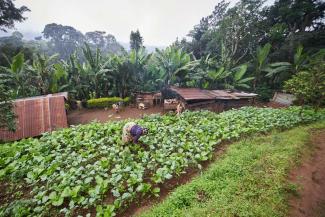Smallholder farmers
Neglected, but essential agricultural heritage

Family farms and traditional agriculture deserve far more attention in policymaking than they are getting. They are indispensable for global food security. Data from the UN Food and Agriculture Organization (FAO) revealed that farms with fewer than five hectares produced more than 70 % of humanity’s food in 2014. As the UN Sustainable Development Goals (SDGs) cannot be achieved without smallholders, the future of human civilisation hinges on them.
Traditional family farming
- provides highly diversified food products, which contribute to healthy diets,
- offers livelihoods in rural areas where unemployment is a major problem,
- utilises and conserves agrobiodiversity and
- is well adapted to local ecosystems and thus helps to protect invaluable ecosystem services.
It also matters that traditional farming is based on ancestral knowledge. Though not appreciated by all scientists, it is the basis for agricultural innovations and technologies. For example, breeders of high-yielding varieties typically use genetic information from age-old landraces.
The farmers concerned are mostly very poor. They often belong to indigenous and other marginalised communities. It is ironic that some of the world’s poorest and most neglected communities are in charge of vitally important agriculture systems. These rural communities deserve to be rewarded for the work they are doing, and their culture must not be suppressed or displaced. It must be allowed to evolve in ways that improve their quality of life.
Distorted idea of modernisation
Agricultural policies, so far, have been mostly guided by a distorted idea of modernisation. The focus on industrial-scale farming to maximise yields has led to
- unsustainable practices,
- over-exploitation of resources,
- genetic erosion,
- loss of fertile soils,
- imports of exotic domesticated species,
- loss of local knowledge systems and rural values,
- socio-economic instability and
- displacement of marginalised people.
This kind of high-tech agriculture is not the answer to the multiple problems that haunt humankind. A different approach is needed (see Susanne Neubert in www.dandc.eu). Smallholders, family farms and indigenous groups should not be looked down upon. Their production systems should be carefully intensified. It makes sense to use new methods that
- lower environmental impacts,
- can be applied more precisely and
- reduce waste in processing, transport and marketing.
In many parts of the world, traditional agriculture systems have collapsed or disappeared. That is especially so in supposedly “advanced” nations. Nonetheless, millions of hectares are still under traditional farm management, with raised fields, terraces, polycultures (with different crops growing in the same field), agroforestry systems et cetera. The stubborn persistence of these practices is evidence of smallholders’ creativity and resilience. They have stuck to local strategies and kept developing them in ways that serve their needs and are tailored to their local resources and environment.
History of marginalisation
Unfortunately, these local communities have a long history of being neglected. What was prioritised instead was to increase farm production with price subsidies, intensive practices, specialisation and new technologies. As argued above, the price was very high in both socio-economic and environmental terms. Rural poverty has indeed worsened, and migration to urban slums is occurring in many places.
By contrast, diversified, eco-friendly farming with multi-cropping and various forms of animal husbandry was only rarely promoted. There is a general lack of support for smallholders and especially indigenous farming communities. Precious little research is done to improve their lot. As a result, the foundations of their agricultural “culture” are being eroded. The biodiversity they have been guarding is disappearing as well.
Surviving in harsh environments
The basis for developing sustainable agricultural systems should therefore be the very systems that traditional family farmers have inherited and incrementally modified over centuries. These systems are complex and well adapted to the local conditions. Indeed, smallholders have managed to cope with very harsh environments. Most of their production systems do not depend on external inputs and technologies, but have nonetheless safeguarded communities’ basic food security and covered their subsistence needs in the course of history.
Humanity needs models of agriculture that allow us to eradicate poverty (SDG1) and end hunger (SDG2). Other SDGs, such as climate action (SDG13) or the protection and restoration of ecosystems on land (SDG15), matter too, of course. We need agriculture that is productive, environment-friendly, biodiverse and socially just. The community-based systems which have fed humankind throughout history meet these criteria. And they still feed masses of people in disadvantaged world regions.
In appreciation of their relevance, the author, as the Task Manager of the Agenda 21 on behalf of the FAO, launched a programme called GIAHS 20 years ago. The letters stand for Globally Important Agricultural Heritage System (see box).
Focus on Smallholders’ needs
Sustainability must be first ensured at the local level. The logical consequence is that agriculture systems should fit the existing socioeconomic and natural environment. Time-tested community-based systems must not be uprooted or displaced. They must be carefully adopted and enhanced. This is a delicate challenge because there is no blueprint that would fit every situation. Every local system is special. To boost its productivity, one must understand the local ecosystem, relevant science and the local traditional knowledge. The new science of agroecology has its roots in these principals.
Prospects for the young generation
Since the early 1980s, hundreds of agroecology projects have been undertaken. They were driven by farmers organisations, visionary scientists and non-governmental organisations. To a minor extent, state agencies were involved too. Experience shows that it is possible to blend traditional knowledge with new scientific insights. This approach serves to increase productivity and improve food security without harming the natural environment. There is an important socio-cultural angle too. The future sustainability of agriculture depends on young people staying in rural areas, implementing farming innovations and creating sustainable livelihoods. If they do not see a future for themselves in the villages, they will leave.
Agricultural research should focus on smallholders’ needs
Local food sovereignty, moreover, matters very much. It is based on local autonomy in regard to production, processing, marketing and consumption. Important preconditions are that farmers have appropriate access to land, seeds, water, technology and energy. Farmer-to-farmer networks tend to be very useful in this context.
Local food sovereignty also means that farming communities must not depend on imported inputs from large multinational corporations. The background is that private-sector giants have a pattern of forcing clients to relying on innovations that enhance corporate profits along with the yields, but do not necessarily improve farming communities’ welfare. Around the world, scientific agricultural researchers should therefore focus much more on the needs of smallholders and family farmers (see Hildegard Lingnau on www.dandc.eu).
Historical evidence shows that smallholder farms can play their vital part in
- poverty alleviation,
- economic growth,
- job creation and
- community empowerment.
To do so, they need to be supported by public policy and government-funded investments. Rural infrastructure is essential. Policymakers must not forget that smallholder provide food to local markets in a potentially resilient way, and their farms serve as social-safety nets.
The importance of dietary diversity must be recognised too. The combination of various crops and animals in traditional agroecosystems allows farmers to make good use of ecological niches; thus increasing the variety of locally available nutritious food (see Rabson Kondowe on www.dandc.eu).
Indeed, opting for one variety of a crop instead of another can make the difference between micronutrient deficiency or micronutrient adequacy. The traditional landraces, which local communities have bred of millennia, have further vitally important qualities. Their diversity offers varieties that suit many different environmental circumstances, which is precisely why they are needed to create high-yielding varieties of rice, wheat and maize (see Melaku Worede on www.dandc.eu).
Global food security cannot be sustainably achieved without the local plant-genetic resources and the traditional knowledge of marginalised farming communities in many world regions. Their own food security, moreover, will benefit from incremental change geared to higher productivity.
The plain truth is that some of the world’s poorest people are the best custodians of genetic resources and other natural resources, environmental services as well as cultural inheritance. Improving their lot is the appropriate approach to ending hunger.
Parviz Koohafkan is the founder and president of the World Agricultural Heritage Foundation. He is a former director of the UN Food and Agriculture Organization (FAO) and started its Globally Important Agricultural Heritage Systems programme (GIAHS) 20 years ago.
parvizkoohafkan@gmail.com
https://worldagriculturalheritage.org/












